- Home
- Laura Anne Gilman
Red Waters Rising Page 2
Red Waters Rising Read online
Page 2
Gabriel’s gelding turned his arched neck to look at her; her voice might have gotten a touch high-pitched in her exasperation. She made a face at the horse, and one of its ears flicked at her as though it were laughing.
“Large,” Gabriel said finally, when their companion was silent. “Nowhere near the size of a city in the States, of course, but larger than anything you’ve ever seen before. Crowded. And crowded with people who came here from all different places, for all different reasons. All sorts of people, not all of whom would be given pause by that sigil in your hand.”
The native Rider glanced at her hands where they held Uvnee’s reins, and she let go with her left hand, pressing the palm flat against her thigh instinctively, as though to hide the markings there. The thick black lines were a reminder of what she had asked for, the Bargain she had made for it nearly a year earlier. Power, and respect.
The devil didn’t ask for more than you could pay. But all she’d had to pay with had been herself. And while power might rest in the palm of her hand, respect had to be earned. Face-to-face, and hand-to-hand.
She’d never had to face so many people at once.
“This is a test, isn’t it?”
She heard a faint, familiar huff of laughter from Gabriel. “Everything’s a test, Isobel. Red Stick’s a port city, for good and for ill, and a frontier town into the bargain. You don’t control places like that, you just hope for the best.”
“Thank you for your reassurances,” she said tartly, knowing that it would only make him laugh more. She looked up to see Calico Zac watching them curiously, and for a second she wondered what he might look like out of his standard-issue rider’s gear of dustcoat and trou, if his people wore deerskin or woven cloth, if the beaded hatband he wore was the style of his tribe or something he had acquired in his riding, if his people wore their hair longer, or if his short-cropped hair was more usual.
Her thoughts made her frown, wondering where they came from, and Gabriel misinterpreted her expression, moving Steady over a pace so his knee bumped up against hers.
“You’re ready for this, Isobel. Learn it. Learn them. Let them learn you. Local tribes, too.” He cast a glance at Zac, who was still watching them both. “We’ll spend the winter here, then ride the Muddy back up north in the spring.”
She heard something odd in his voice, but before she had a chance to ask, Calico Zac stiffened, lifting his head as though he’d heard something, and Gabriel put a hand on her leg, a warning pressure to be still and silent.
“Sit ready,” he said, squeezing her leg once before pulling his flintlock, a short-muzzled carbine, from its saddle holster. Steady’s reins were dropped almost casually across the gelding’s neck as Gabriel reached with his other hand for the powder and shot, loading the weapon with dexterity she’d yet to master.
By the time she’d heeded his command, gathering her own reins up in a firm grip and unhooking the strap that held her blade against her own saddle, she heard what had alerted them: hoofbeats, coming hard down the road toward them. Three horses, she guessed, light and fast. Isobel thought of the letter still tucked into her pack, waiting to be handed off, and wondered if the approaching horses carried a post-rider she could hand it over to.
That hope was quashed the moment they came into view. Post-riders were often young, but these were mere boys, riding neck and neck with no regard for anyone else who might be sharing the road with them.
Only at the last minute did one of the riders realize they weren’t alone, and pulled his horse, a tall bay, up hard enough to make Isobel wince. The horse danced under him, exuding resentment that it had been forced to stop, and the other two riders followed suit, if a little less abruptly.
She could practically feel Gabriel’s desire to shoot them, simply for mishandling their horses, and the curl of Zac’s lip suggested he felt the same.
“Easy . . .” she said, soft as though she were speaking to her mare, and Gabriel’s arm eased slightly, the carbine no longer pointing in their direction, although still held ready in the crook of his arm. She could not see what Zac was doing on the other side of Gabriel and Steady’s bulk, but she did not doubt that he had a weapon at the ready as well, likely the horn-handled blade she’d seen him sharpening.
Trusting them to stay calm, she shifted her focus to the newcomers. They were young and male, their heads bare, skin pale enough to tell her they did not work outside, that this was a jaunt for them, briefly released from counter or desk.
There was a tense silence. One heartbeat, then another.
“Bonjou!” the first boy finally called out. “Konmen lé-zafè?”
The words sounded familiar, but meant nothing to Isobel.
“Better for not being knocked over,” Gabriel said tartly, clearly having no trouble understanding them. “Does your papa know how you’re mistreating his cattle?”
That stung, as he’d clearly meant it to, and the boy drew himself up, pushing his horse closer in a high-stepping sideways dance, showing off his control of the beast. “Bo Argent’s mine, and I’ll have a whip to you for presuming otherwise, étranger.”
They’d been speaking French, Isobel realized, although with an accent she had never encountered before. Odd, to hear it spoken this far south, where Gabriel had told her that Spanish or Portuguese, or even Inka-Quechua was more common.
Closer, she could see that the boys were likely near to her own age, their leader wearing a fine white shirt with a banded collar like Gabriel’s, but white as though it had been dipped in bleaching powder only that morning, and his trousers were black and clean, with boots shining underneath.
Money, she thought, Marie’s training allowing her to estimate the cost of everything he wore, likely down to a quarter-coin. Money, and careless with it.
Acadians, she realized. Gabriel had mentioned them briefly. Settlers from the Northern Wilds, where his own people came from; refugees from the war between France and England. While his folk had lingered just within the Territory’s border, Acadians had gone downriver, as far from the remains of war as they could reach.
They had taken their wealth with them, clearly, or rebuilt it in the decades since then.
Isobel wasn’t impressed by her first encounter.
“Peter, hush,” a second boy said, his voice lower, and in English, his desperate glances up at Gabriel making it clear he intended them to be understood. “We near ran them off the road, riding reckless as we were. And if you’d injured Argent, your papa would be the one to lift the whip and land it on your backside, not his.”
“He insulted me,” the first boy retorted, never dropping his own glare from Gabriel. “He and his boys, and their mule,” he added with a sneer, “should be along the side, not taking up the full of the road.”
Isobel sucked at the inside of her cheek to keep from responding, but the third boy did it for her, his cheeks flushed with embarrassment. “My apologies for my brother, mademoiselle. We only now realize he is blind in one eye and half-witted to boot.”
Only then did the first boy’s gaze flicker to Isobel, then down, finally taking in the fabric of her skirt tucked around her legs, then up to note the swell of her blouse over her bosom. Isobel lifted her chin, eyes narrowing as though to dare him to make further comment.
None of them apologized to Calico Zac, however.
“Pah. Boy or girl, it makes little difference. They are in our way and they must move. After this man apologizes for giving insult.”
There was a pause, letting his words sink in. Giving insult was serious business. Isobel had judged and carried out sentence for that crime, could still feel the drip of their blood on her fingers, for all that she’d never laid hand on them. For this . . . boy to claim Gabriel had given insult . . .
Breath gathered in her mouth to speak, when she glanced sideways and saw that corner of Gabriel’s mouth that had twitched earlier was now pressed flat, not in anger but the need to suppress laughter, and across Steady’s neck she could see Calico
Zac’s hands open and close, the trade-sign for “infant” clear in his fingers. And suddenly her own chest was tight with the same, the absurdity of the moment like cool water on her skin, and her temper.
They were only boys, full of themselves and their self-importance, no more a threat than a cattle-hand with one whiskey too many in their belly and hands prone to wander without asking.
“Ah, oui, an apology you have, then,” Gabriel said, and if his words were placating, his voice was merry enough to be taken for further insult. “We are most sorry to have encountered you on the road, and will endeavor to not do so again.”
Gabriel had been trained to the Law, in the States, and when put in the mood could speak circles around his opponents. She had heard him go on in similar manner once, when they’d unwillingly shared a camp-fire with bandits, insulting all within earshot with such graceful language they’d been taken for compliments. But from the way the boy’s eyes widened, he had education and wit enough to recognize it, and pride enough for it to go down the wrong way.
He pulled his shoulders up, staring down his nose at them. “Your name, étranger.”
“Gabriel Kasun.” Names had power, but her mentor gave his as though no power could touch him, as though giving it to these boys was less than whispering it to a tree. Her lips parted in awe at the subtlety of the insult, worthy of the boss at his worst, and tucked it away if she ever needed use it herself. “And these are my companions, Calico Zac”—and the native inclined his head gravely at them—“and Isobel née Lacoyo Távora.”
She tipped her hat at them in perfect mimicry of Gabriel when he played at being card-sharp, taking her cue from his tone.
“But you would best know her by her title,” Gabriel went on. “The Devil’s Hand.”
Isobel had learned that there were three general reactions to settlers when they heard who she was. Most pretended unconcern, watered by a faint respect. Some were impressed, or awed. And some few pretended as though they’d never heard the phrase, had no idea what the Devil’s Hand might have to do with them, or they the Devil’s Hand.
Rarely did anyone attempt to kill her.
TWO
Gabriel had been in more fights than he cared to remember, with guns and knives and fisticuffs, and he knew it was already too late, the throwing knife cutting air, aimed at Isobel’s unprotected chest, too fast for her to react, too fast for him to intervene. He was cursing himself for becoming complacent, for dismissing boys merely for their youth, for every mistake ever made.
But while his heart raced, the world around him seemed to slow, his thoughts a second ahead of his actions, logic rather than panic determining how he reacted. Even as his carbine dropped back into ready position, finger curled under the guard, pulling the trigger, he was kneeing Steady forward, knowing the shot would go wide but hoping the noise would spook the horses, cause them to unseat their riders.
A high-pitched whinny followed by swearing in Acadian patois told him at least one horse had done just that, and his lips stretched in an ugly grin even as he reached the boy who’d thrown the knife. Steady barreled into the side of the other horse, while Gabriel lashed out with his free hand, grabbing him by the hair and yanking him out of his saddle.
Off to his side, he was vaguely aware of Calico Zac reining his dun out of the way, and gave a momentary prayer of thanks for that—the last thing this needed was for a native to get caught in the fracas.
The boy—Peter—went to his hands and knees in the dirt, scrambling to avoid Steady’s hooves, hissing words Gabriel’d wager hadn’t been learned at his mother’s knee. Breathing heavily, Gabriel slotted the firearm back into its holster and wheeled Steady around for another go. He’d show this boy how to give insult.
“Don’t kill him,” a voice called out in French, then English, “please, do not kill him.” He was tempted to ignore them, the blood rushing in his ears louder than their turnabout pleas, until he heard Isobel call his name.
“Gabriel, no!”
He reined Steady in before the gelding could trample the boy under his hooves, but kept within reach, the gelding between the boy and Isobel and her mare. His chest was heaving, sweat itching his eyes, and the urge to violence thrummed under his skin like the roar of a waterfall.
Something still sane warned him that this was not him. The violence was not entirely his own: there was a snarl of something unworldly within it, hissing for violence and retribution.
No, he thought. No. These were children. Foolish, posturing children, but children. Get thee from me: I do this my way.
He forced the rage down, sending it under water and mud to cool. It was harder than it should have been, but it went, snarling resentfully. He shuddered once, as though a haint had touched his skin.
“Gabriel?” Isobel didn’t touch him, didn’t reach out, but he could feel her there, waiting, her own breath a harsh rasp. She was unharmed.
The other two boys were off their horses now, watching him the way you might watch a ghost cat up on the rocks, reasonably certain it won’t leap but not willing to lay bets on it, aware that you won’t have time to shoot if it changes its mind. He moved Steady a step away, then another, until there was room for them to get their companion, hauling him to his feet with little care and much haste.
Peter was still snarling, fighting their hold, ready to lunge the moment they let him go.
“Easy, boy,” Gabriel said, as much a warning as advice. “Don’t go being further foolish.”
The rage was gone; he was his own man again, and he didn’t wish to hurt the boy any longer, but he would, if it came to that. “Whatever maggot lodged in your brain, to make you behave that way?”
There wasn’t a particular rule of hospitality on the Road itself, not the way there was once you’d made camp, but there was a certain courtesy, if you followed the law. You didn’t assault a man—or a woman—without cause or insult far greater than anything this boy could have claimed. And if you did, and survived the attempt, a marshal might come pay close attention to you. The sort of attention that typically ended with a bullet between your eyes, and your family burying you for a fool.
“Listen to the man,” one of boys said urgently. “Think, you idiot. She’s too young to be the same one.”
“Je m’en fous.”
“The same one what?” Isobel sounded confused, then she said “oh,” even as Gabriel realized what the boy was nattering about. Isobel was not the first Hand ever; there was Marie, the Devil’s Right Hand, but as far as Isobel had said, she never left Flood. It was only the Left Hand who rode: but the last one had died . . . long ago. Before Gabriel had been born, much less these youths. So long ago that there were only stories left, and none who could tell them firsthand.
It was possible, though, that those stories had been handed down. And equally possible that those telling them had originally come out on the wrong side of the Hand’s judgment.
That was a complication he had not anticipated.
“I’ve offered you no harm,” she said. “And I came here with no intent—”
“You’re all the same,” the boy spat, although he had ceased to fight against those holding him. “All instruments of the devil, the stick that beats us to nothing, the fist that knocks us into the dirt. Your master and you both should have been burned to the ground and your ashes thrown back into the pit from where he came, long ago!”
At that, Isobel went very still. Gabriel was no magician, to sense the winds rising or power gathering, but he knew Isobel, and he knew storms.
“Your papa should have taught you manners, if he could not teach you wisdom,” she said, and he could hear the words crackling in her mouth like lightning. “Or sent you across the border, if you refute the Agreement. Nothing holds you to the Territory, if it displeases you so.”
“The Territory is ours! You’re not wanted, you and yours. Some day—!”
His companion on his right clogged him across the head, and the boy slumped forward midword, unc
onscious. “His papa and mama will forgive me, even if he does not,” his assailant muttered, hauling the body backwards, while the third stood between them and Gabriel, as though to guard their escape.
“Teach him to mind his manners before power,” Gabriel told them, one wary eye on Isobel, who was rubbing the fingers of her right hand across her sigil-scarred palm in a manner he did not trust. “Or the next time he opens his mouth, it may be in front of someone less lenient than she, like a magician—or the devil himself.”
If that didn’t put the fear into them, their deaths would be a mercy to the world.
The horses shifted uneasily but allowed them to remount, the unconscious boy draped forward over his horse’s neck, his legs quickly tied to his stirrups.
And then they were gone, riding back the way they’d come, leaving only churned-up dirt and dust, and a swirling, burning sensation in Gabriel’s stomach. He turned to his charge, pushing all else aside for the moment.
“Are you all right?”
Isobel took a moment to consider his question, then nodded. “He had terrible aim.”
The knife he’d thrown lay point-down in the dirt, only inches from where she’d been.
“Fortunate for him,” Gabriel said tightly. He realized his fists were clenched, and thought of cool water, a river in late summer, deep and slow. “Killing them would not have served us well, going into town, no matter how justified it was once he took first blow. It’s good warning, though. If well-heeled young fools like that have bought into that nonsense, others here will as well.”
He turned to look at Calico Zac, who had dismounted at some point, watching them with wide, cautious eyes. “Did you know anything about that?”
Isobel was using her hat to brush dirt off the back of her skirt, sticky strands of black hair that had escaped from her braid now clinging damply to her face and neck. She frowned down at her boots, then replaced the battered hat firmly on her head. “What nonsense?”
“Free Territory nonsense. The idea that the devil’s holding ’em back, keeping ’em from . . . god only knows what. Getting into trouble, most likely. We’ve seen it before.” He waited until she nodded, remembering. Even close to Flood, there were those who saw the devil as, at best, an overly protective parent they’d outgrown.

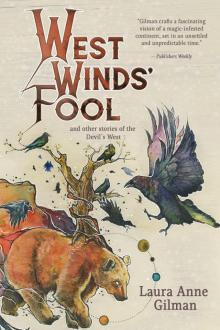 West Winds' Fool and Other Stories of the Devil's West
West Winds' Fool and Other Stories of the Devil's West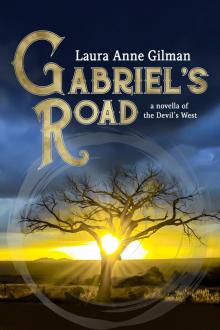 Gabriel's Road
Gabriel's Road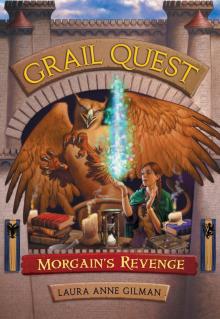 Morgain's Revenge
Morgain's Revenge The Shattered Vine
The Shattered Vine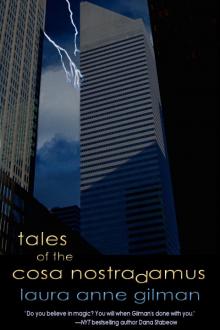 Laura Anne Gilman - Tales of the Cosa Nostradamus
Laura Anne Gilman - Tales of the Cosa Nostradamus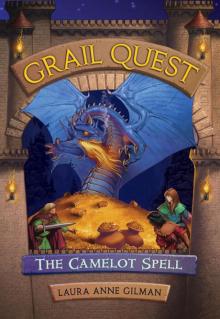 The Camelot Spell
The Camelot Spell VISITORS
VISITORS Staying Dead
Staying Dead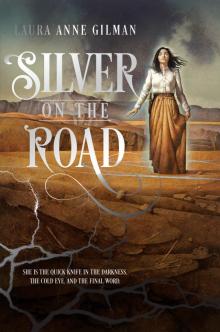 Silver on the Road
Silver on the Road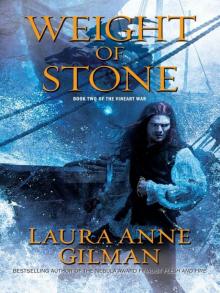 Weight of Stone
Weight of Stone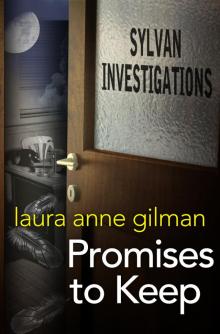 Promises to Keep
Promises to Keep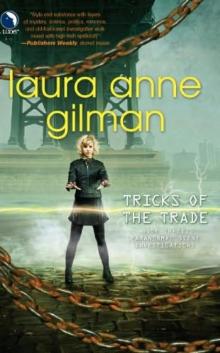 Tricks of the Trade psi-3
Tricks of the Trade psi-3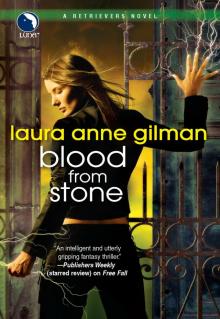 Blood from Stone
Blood from Stone Soul of Fire tp-2
Soul of Fire tp-2![Pack of Lies [2] Read online](http://i1.bookreadfree.com/i1/04/01/pack_of_lies_2_preview.jpg) Pack of Lies [2]
Pack of Lies [2]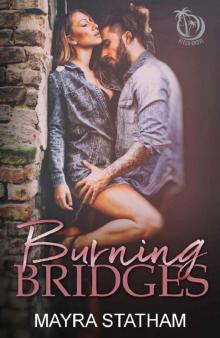 Burning Bridges
Burning Bridges The Work of Hunters
The Work of Hunters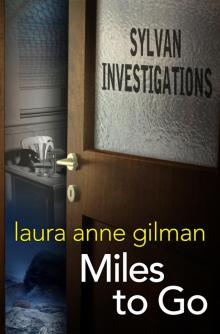 Miles to Go
Miles to Go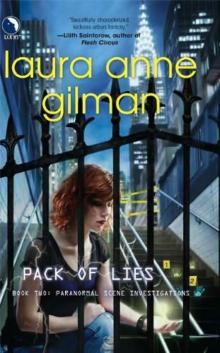 Pack of Lies psi-2
Pack of Lies psi-2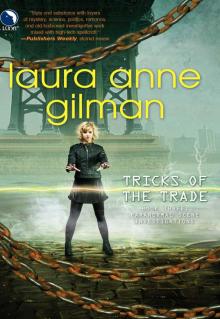 Tricks of the Trade
Tricks of the Trade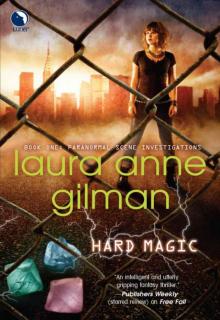 Hard Magic
Hard Magic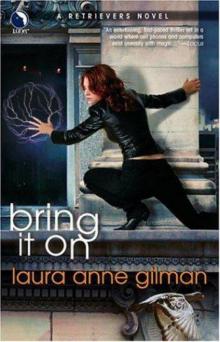 Bring It On
Bring It On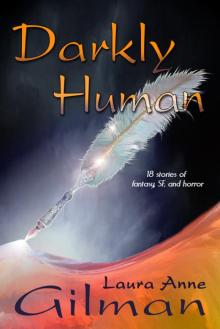 Darkly Human
Darkly Human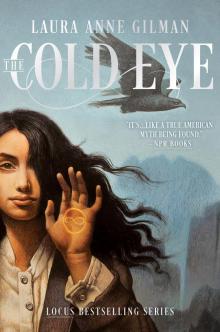 The Cold Eye
The Cold Eye An Interrupted Cry
An Interrupted Cry Soul of Fire
Soul of Fire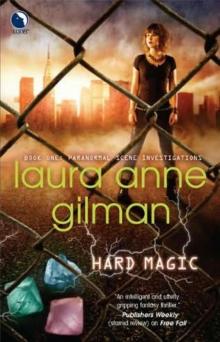 Hard Magic psi-1
Hard Magic psi-1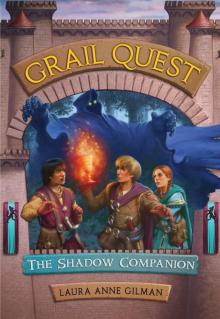 The Shadow Companion
The Shadow Companion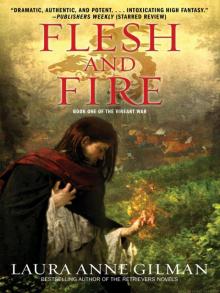 Flesh and Fire
Flesh and Fire